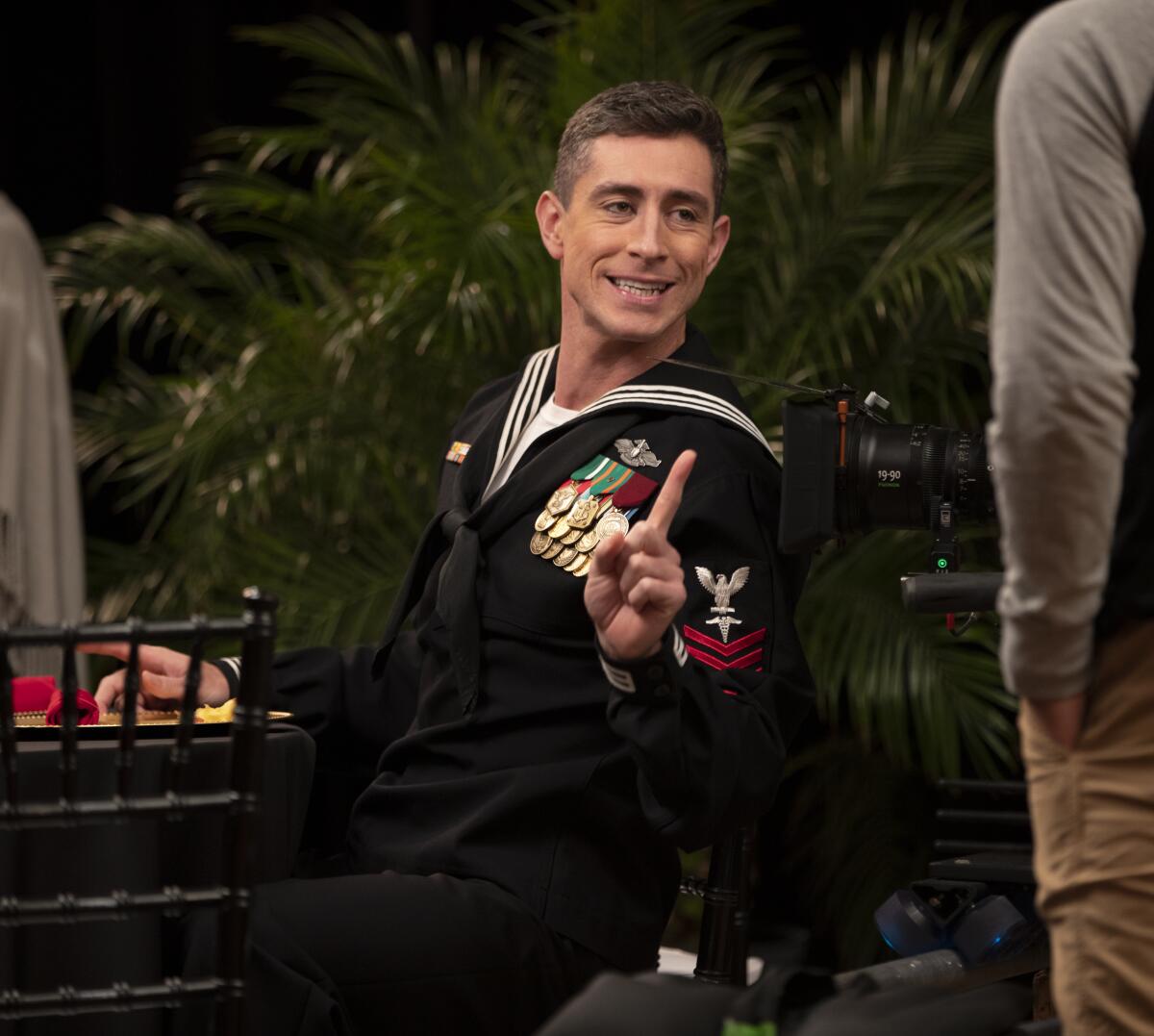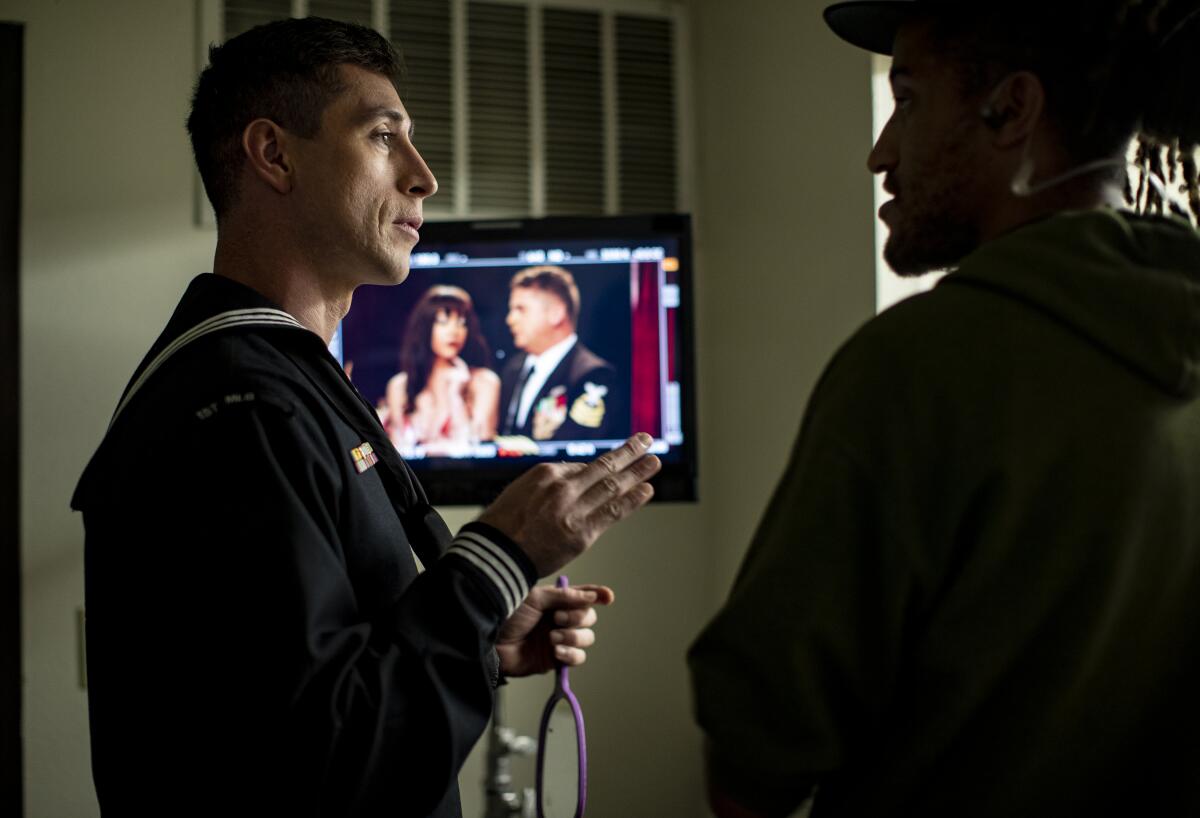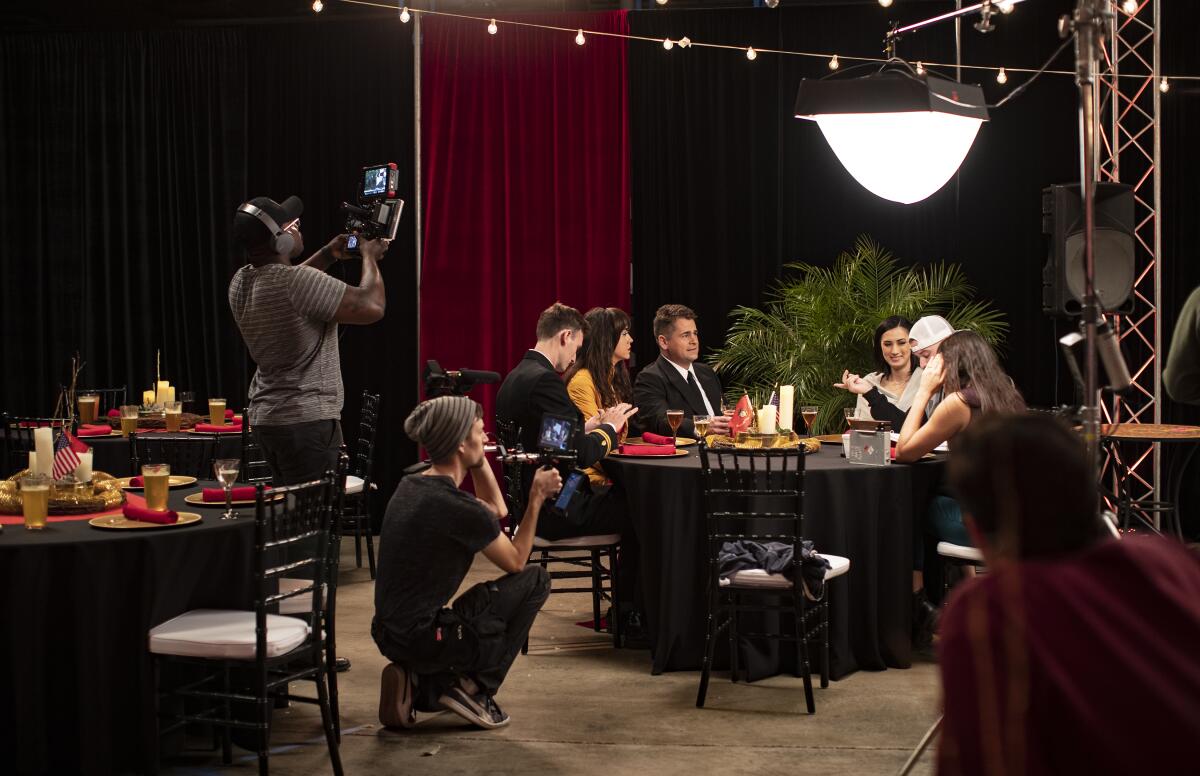At Vet Tv, ‘don’t expect anything to be politically correct, professional or honorable’

- Share via
In the warehouse of an abandoned animal shelter in Riverside, Donny O’Malley is getting ready to reprise one of his most popular characters. The occasion is production on a show called “Devil Docs,” a web comedy about Navy corpsmen billed as “Scrubs” for the U.S. military. The character is Donna Brunswick, a transgender staff sergeant.
“Hold back all the laughter,” he jokes to the quiet room of cast and crew, many of whom are veterans or active-duty military, as they settle in for more takes on a scene set at a Marine Corps ball. “I know you’re trying really hard to hold it back in.”
Standing at a podium, O’Malley sports an extravagant red gown and glittery makeup. The Brunswick character, whose first official appearance came in a 2017 episode of the webseries “Kill, Die, Laugh” titled “Transgender Drill Instructor,” is, ostensibly, a transgender woman, but the effect is deliberately extreme: O’Malley, a Marine Corps vet, protrudes wildly from the dress with the build of someone who appears able to lift a small car.
A good number in the military community would recognize O’Malley on sight, regardless of his appearance. Besides being its frequent star, he is also the CEO and lead writer, director and producer of the VOD streaming network Vet Tv. The service, which has more than 50,000 subscribers at a rate of $5 a month, is marketed directly to members and veterans of the armed forces, particularly the extensive, web-savvy, post-9/11 generation.
With a new video released once a week, every week, O’Malley and his staff, which has grown to 15 full-time employees, nine of them veterans, have accumulated some 60 hours of original material, spread across more than a dozen series and one feature-length film. The material is extremely crass: Almost none of it could be aired on a channel like Comedy Central, and the platform’s movie, “A Grunt’s Life,” was rejected from Amazon for “being too offensive.” The staff says its crude sense of humor is reflective of a large portion of the military — whether civilians would understand it or not.
“Don’t expect anything here to be politically correct, professional, or honorable,” Vet Tv’s 2016 Kickstarter campaign page stated. “Don’t expect us to represent the U.S. military the way the commercials want us to, or the way you think we should. We made our sacrifice; we don’t owe anyone ...” The campaign took in almost $300,000 — $50,000 more than its targeted goal.
***
“Two years ago, I was Googling ‘free locations to film,’ and Riverside popped up,” says John Acevedo, Vet Tv’s COO and CMO. While the Marine Corps ball shoot continues back in the warehouse, he’s showing off the rest of the company’s DIY production studio — a substantial commute from the San Diego area, where most of the employees live, near Camp Pendleton. Passing through an unoccupied “Devil Docs” set, remnants of a recent shoot linger, with prop syringes and fake blood strewn across the counters.

“It looks like trash because that’s literally what a battalion aid station in the military looks like,” Acevedo says. “It’s like, is this Third World? Doesn’t the military have [15] percent of our budget? Why is this the clinic that they have?”
After he was discharged from the Marine Corps in 2016 — “this long ago,” he says, pointing to his shoulder-length hair — Acevedo cold-emailed to see if he could get involved with O’Malley’s nonprofit, Irreverent Warriors, which organizes veteran hikes around the country with the goal of “healing with humor.” Acevedo’s contact coincided with the launch of Vet Tv, and he became one of the network’s first employees. “I would say there’s two people that actually have formal education in any job we have,” he explains. “We basically learned through Google and YouTube while working in the company.”
Production coordinator Turner Fair, who is one of the few full-time staff members who didn’t serve in the military and who would later be seen in costume as a rapper with a fake tattoo of a penis on his neck, joined because of those DIY ideals. “I’ve always wanted to be a part of renegade filmmaking, and to push the boundaries of things,” he says. “There is still a sense of unity in trying to do something that we don’t necessarily understand but know needs to be done.” (Fair has since left Vet Tv.)
What needs to be done is at the center of Vet Tv programming. War-related movies and series are evergreen in Hollywood, but they are almost universally produced with civilian audiences in mind — audiences whose understanding of the military is largely based on other movies and series they’ve already seen.
O’Malley’s mini-empire is based on the idea that there is a veteran market yet to be fully captured. (By comparison, AMC Networks’ four niche streaming platforms — Shudder, Acorn, Sundance Now and UMC — together count more than 2 million combined subscribers.) And with veteran suicide at an epidemic rate of at least 17 a day, Vet Tv is also built on the belief that there is good to be done in the process of capturing this specific audience.

“If Vet Tv tended to everybody, it wouldn’t be Vet Tv — it would be TV,” says Zachery Laning, a digital media producer and Marine vet. “And you can say, ‘That’s not for me,’ but it helps people! It’s insane: The first weekend I worked, we did an Irreverent Warriors hike in Texas, and you don’t know how many people came up to Donny and were just like, ‘Man, Vet Tv literally saved my life, ’cause I got out and I didn’t have friends, I didn’t have anybody to talk to, but I could sit down and feel like I was back at work and back in the military. And I was laughing like I haven’t laughed in a long, long time.’”
***
Donny O’Malley is a stage name. Born Daniel Maher Jr. in 1983 in Queens, N.Y., to a military family (his father was a Marine officer, before he went to medical school and became a physician in the Navy), O’Malley grew up enraptured by war epics like “Born on the Fourth of July,” “Hamburger Hill” and “Platoon.”
“These are all atrocious Vietnam movies,” he laughs from a couch in a break room — adjacent to what clearly used to be a kennel — while the production takes lunch. “And some of ’em are Oliver Stone, who’s super antiwar. I remember watching those movies and thinking” — here he adopts an amped-up little-kid voice — “‘I gotta be a Marine!’”
After going to college at San Diego State, O’Malley, against his father’s protests, became a Marine officer himself, eventually deploying in two tours, one of them in Afghanistan. The mission there, as recently detailed in the Washington Post’s “Afghanistan Papers” report, was perceived by many of those present to be almost entirely pointless.
“We get there and we’re training with the Afghan army, and their level of pathetic-ness was beyond comprehension,” says O’Malley, who served as an officer for almost six years.
He describes the experience of fighting to establish bases in Helmand province only to watch the bases immediately be retaken by the Taliban as soon as the U.S. tried to hand them off to local forces: “As we’re still there, [the Taliban are] taking over!” he says. “I talk about this a lot with other veterans, because I want to improve mental health, and talk through the frustration of knowing that my buddy just blew his legs off, and my other buddies just got shot, and my other buddies just died, for what? It’s wild.”
O’Malley insists that his own reentry into society wasn’t particularly fraught (“I never killed a civilian, so my conscience is clean,” he says), but after a friend who was a veteran committed suicide, he redirected his writing career to focus on military mental health. He then decided to start a production company in the spirit of Adam Sandler’s Happy Madison, a content hub creatively fueled largely by Sandler’s friends. But with a comedic voice that could be described as Sandler via Pauly Shore, O’Malley has also amassed a substantial number of critics.
There are Vet Tv skits that are deeply misogynistic: One particularly egregious skit makes fun of PTSD by advertising a “Night Terror Neck Brace” for abused military spouses. Others are deeply racist: In several skits, O’Malley wears brownface makeup while imitating Middle Eastern caricatures. And objections to the material are not just coming from civilians who don’t “get” the “humor.”
On military message boards there is vocal disapproval from those who label it as “boot,” or immature (“I thought I would like it, but it just comes off as a little cringy to be honest,” says one user in the “Veterans” subreddit). And for certain senior figures in the military, it’s a pain and counter to the ongoing work to make all Americans feel welcome in uniform — not just straight, white men.
“I get what he’s trying to do, but it’s hard to watch it and not think of it as being anything other than really offensive,” says Col. Don Christensen, former chief prosecutor of the Air Force and president of Protect Our Defenders, an organization dedicated to eradicating rape and sexual assault in the military. “A lot of the problem within the military is getting people to think like adults versus frat boys. This just feeds into those who [want to make] fun of women, the LGBTQ community, or whatever it is.”
Brynn Tannehill, a Navy veteran who piloted aircraft in three deployments between 2000 and 2004 and an activist in the transgender community, responded directly to the character of Donna Brunswick. “The idea that trans people are simply men in dresses is a stereotype that is unhelpful,” she says. “If you are othering people, that makes things more difficult.”
Asked about the misogyny in past Vet Tv skits, O’Malley — who has responded defiantly to such questions in the past — now expresses remorse: “That’s all my mistake,” he sighs. “Because my only thought when starting the business was, ‘Our audience is [90%] men. We are not going to expect a single woman to give us a dollar, and without dollars we don’t have a business. ...’ I didn’t think about a bigger picture.”
He also regrets the brownface: “The problem I learned afterwards was people didn’t just perceive it as us parodying terrorists — it was us parodying Middle Easterners, and that puts us in a whole other bucket,” he says. “So are we going to do [brownface] again? No. I would absolutely do the skit again, just not do the brownface. I wouldn’t play the role.”
O’Malley says he is trying to learn and improve — and he does seem earnest about that. As for the Brunswick character, however — the one he played that very day — O’Malley doesn’t believe he’s doing anything wrong. “My goal is to develop the ability to continue playing that character in a manner that transgender people who have felt that pain [of discrimination] can appreciate,” he says.
Tannehill doesn’t think that’s possible. “I don’t know that there is anything that can be done with the character, because the character is a caricature and being played by a cisgender person and in and of itself is problematic,” she says. “I appreciate [O’Malley’s] desire to try to do better. But sometimes a particular character or a particular situation is not salvageable, right?”
***
Back in the warehouse, an older man arrives late in the day, dressed neatly, with impeccable posture and toting a friendly golden doodle named Bella. This is O’Malley’s father, Daniel Maher Sr.
“He asked me not to,” Maher laughs, when asked if he calls his son Donny on set. “But everybody does, and since I’m Dan, I call him Donny when I’m around his staff.”
Using his decades of experience in multiple branches of the military, Maher serves as a senior advisor to Vet Tv. But he notes a difference between his experience and his son’s. “His generation has served in combat — that’s a whole different ballgame,” he says. “There is no understanding of how somebody feels with the stresses they went through, and what they were asked to do.”
He’s accepting of how his son, and his son’s fans, are processing the experience of being in uniform — even if it’s hard to imagine him laughing at Vet Tv skits.
“[Early on] I would talk to my chief, my HM1, all these senior enlisted,” Maher remembers, “and say, ‘Check this out, my son is doing this stuff, does that make sense to you?’ And they would go, ‘Oh my God, he’s barely touching the surface.’”
More to Read
The complete guide to home viewing
Get Screen Gab for everything about the TV shows and streaming movies everyone’s talking about.
You may occasionally receive promotional content from the Los Angeles Times.








